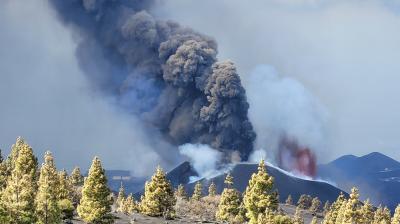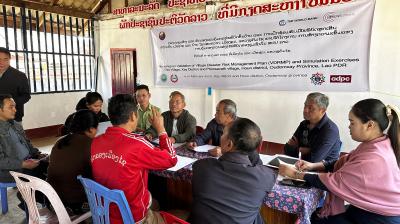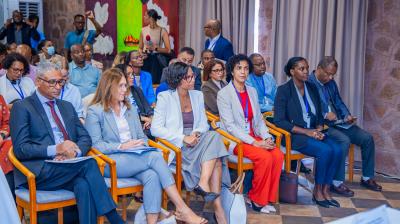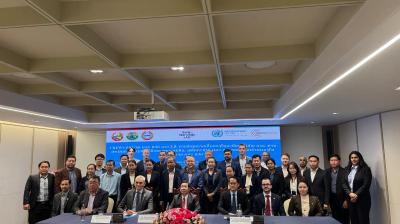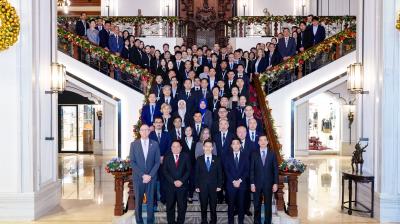UN General Assembly highlights WMO’s leadership on early warnings and climate action
The opening days of the 79th session of the United Nations General Assembly (UNGA) have highlighted the need for global action to address climate change and the growing impact of extreme weather events. As a core part of this year’s discussions, the World Meteorological Organization (WMO) took center stage with the Early Warnings for All (EW4All) Initiative, which aims to protect every person on Earth from hazardous weather through life-saving early warning systems by 2027.

WMO emphasized that while significant progress has been made in some regions, particularly in countries like Chad and the Caribbean, there are still critical gaps in many areas. These gaps are mainly due to insufficient funding, lack of coordination, and technology challenges, particularly in The Least Developed Countries (LDCs) and Small Island Developing States (SIDS). The call to action was clear: global cooperation and investment must be scaled up to meet the ambitious targets of the EW4All Initiative.
WMO Secretary-General at NYC Climate Week Opening
On September 22, WMO Secretary-General Prof. Celeste Saulo participated in the opening ceremony of New York Climate Week, joining a high-level panel to discuss the urgent need for climate action. The panel featured climate leaders, including the Ministers of Foreign Affairs of Norway and Ireland, and representatives from the private sector.
Prof. Saulo emphasized the importance of early warning systems in mitigating the impacts of climate change, noting that 2024 is set to become one of the hottest years on record. "The cost of inaction is far too great to ignore," she stated, referring to estimates that global economic losses due to climate inaction could surpass USD 1,266 trillion by 2100.
She further highlighted the role of meteorological data and climate forecasting in shaping global responses to climate risks, noting that WMO's work has been central to the scientific foundation of the Paris Agreement and many national climate adaptation strategies. Prof. Saulo underscored the need for better global coordination, investment in observational systems, and innovative financing to support countries in building more resilient societies.
Pact for the Future: A Commitment to Global Climate Action
Earlier on Sunday, the UN General Assembly adopted the "Pact for the Future," a landmark declaration reaffirming the commitment of UN Member States to sustainable development, peace, and stronger global governance. The Pact aligns with WMO’s vision of a safer and more resilient world, calling for urgent climate action and partnerships across sectors to accelerate progress toward the Paris Agreement and the Sustainable Development Goals (SDGs). It explicitly includes a commitment to deliver early warnings for all: “Protect everyone on earth through universal coverage of multi-hazard early warning systems by 2027, including through the accelerated implementation of the Early Warnings for All initiative.”
WMO welcomes this strong commitment and looks forward to working with its members and partners to implement effective climate solutions that protect communities from the growing risks of extreme weather.
“One life lost is too many”
As UNGA discussions continue, WMO remains committed to leading the charge in advancing early warning systems globally. On September 23, the SDG Futures Lounge Early Warnings for All high-level event has provided a key platform for international stakeholders to share lessons learned and explore how early warning systems can be integrated into national policies and financing strategies.
“Early warnings for all is not just a goal, but a necessity, stressed Jamaica’s Prime Minister Andrew Holness. By connecting the dots between technology, communication and community, we can build a safer, more resilient world in the face of climate change. “. One life lost is too many", said Selwin Hart, Special adviser to the Secretary-General on Climate Action and Just Transition.
“Hazards are occurring everywhere, but needs are different. I heard today the need of capacity development, data on meteorology and on society. I heard the need of education, research, sharing knowledge. I heard the need for more social scientists. I also heard the huge opportunity that science is bringing to the table. It is about gathering now all these players together, gathering needs and opportunities. This is Early Warnings for All”, emphasized WMO’s Secretary-General Celeste Saulo.

One of the key outcomes of WMO’s engagement in these events is the recognition of the need for system-wide financing to scale up early warning systems
“It is very important that we step up commitment at the national, sub-national and local levels to achieving this global ambition of EW4All”, said Kamal Kishore ASG and Special Representative of the Secretary-General for Disaster Risk Reduction (UNDRR).
Sulyna Abudullah, Special Advisor International Telecommunication Union (ITU) added that “today, 95% of the world’s population has access to a mobile phone. We need to maximize this opportunity to reach the billions of people more quickly and effectively before, during, and after disasters. We are in a race against time.”
Jagan Chapagan, CEO and SG of the International Federation of Red Cross and Red Crescent Societies IFRC concluded the event with a strong call: “Despite all the progress that we have seen, I don’t feel in a mood of celebration. (…) There is huge disconnect between some of the innovation that has been made, and the communities where they matter. Leadership and ownership from the national governments is critical. And on financing, with the current level of resources we will not achieve the goal set by 2027.”
With a clear roadmap set for the future, WMO calls on all nations to enhance their efforts in delivering climate solutions. Through collaboration, innovative finance, and continued investment in meteorological systems, the world can build a safer and more resilient future for all.


